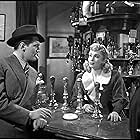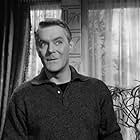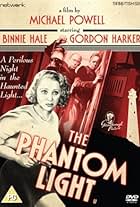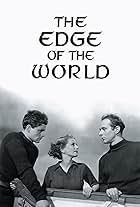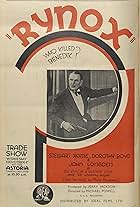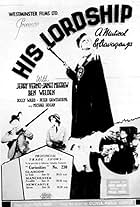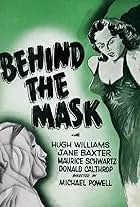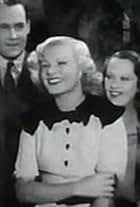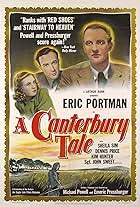Mary Lee is the new head of a Chemistry Laboratory. Thompson and his work-mates are resentful of her appointment and try to make her fall in love with John in the hope that this will make he... Read allMary Lee is the new head of a Chemistry Laboratory. Thompson and his work-mates are resentful of her appointment and try to make her fall in love with John in the hope that this will make her neglect her work.Mary Lee is the new head of a Chemistry Laboratory. Thompson and his work-mates are resentful of her appointment and try to make her fall in love with John in the hope that this will make her neglect her work.
Photos
David Hutcheson
- Thompson
- (as Dave Hutcheson)
Frank Forsyth
- Chemist
- (uncredited)
Storyline
Did you know
- TriviaThis film was believed lost, but a copy was found and was shown at the NFT in London in March 2000.
Featured review
Possibly the least ambitious of these quota quickies Michael Powell had made since The Fire Raisers, The Love Test has the great advantage of being a light romantic comedy. It has a small enough cast of characters so that our focus isn't diverted too much from our main characters (like what happened in Lazybones), and it has that big heart that Powell was showing so frequently. It's a frothy bit of nothing, but it's an endearing and frothy bit of nothing.
Touching on the obvious fascination Powell had with increasing technological advancements, the film centers around a commercial chemist lab that's focused on trying to come up with something to make celluloid non-flammable. For those who've seen Tarantino's Inglourious Basterds (including its quick clip from Hitchcock's Sabotage), you know that nitrate film was highly flammable and a huge problem for the film world for decades. Fox lost almost its entire silent library in a film vault fire (including most of the early work of John Ford and almost all the work of Theda Bera). This has the good sense to not delve too deeply into what the solution to this flammable celluloid could be (it seems to be some kind of coating instead of just a brand new method of making the stuff), but at least it doesn't feel as ridiculous as swimming pools at petrol stations like in Something Always Happens.
Anyway, this chemist lab is headed by Mr. Smith (Gilbert Davis) who has decided to leave in the middle of this critical time to look after his health (manifested by hiccup fits). His second in command, Thompson (David Hutcheson), thinks that he'll be a natural fit for taking on the roll, but when the office secretary, Minnie (Googie Withers), overhears the company president (Morris Harvey), it's obvious that the post will be given to Mary Lee (Judy Gunn). Overcome with emotion at potentially being passed over for a mousy woman, Thompson comes up with a plan for Mary Lee to lose her advantage by getting her to fall in love with John (Louis Hayward), another chemist in the lab. John reluctantly goes along with it (presumably because he already likes Mary Lee).
The bulk of the film is this nascent romance between the two with Mary Lee starting as an ice queen who talks about how the ideal social arrangement is the beehive with one queen and many workers (she sees herself as a worker, not a queen) and John starting as an uninitiated boob in the world of romance. The two slowly open up to each other as Mary Lee begins to like the sense of affection. It's nice.
And then the most interesting contrast happens in the film. Mary Lee decides to buy herself a dress for a dinner with John, so her neighbor, Kathleen (Eve Turner), decides to help her by providing her with everything else. At the same time, Thompson and Minnie come over to John's house to help him become Mary Lee's Casanova by teaching him how to kiss girls. So, Mary Lee strains to become pretty, and John makes out with another girl. In today's parlance, that would be considered problematic. I found it amusing, if unintentionally so.
There are complications that push Thompson to accelerate his plans which involve driving a wedge between John and Mary Lee. It's not a deep conflict, mostly relying on a couple of lies that someone immediately believes without question. However, it does provide this nice backdrop to a comic ending where John is locked up, Thompson has stolen his work, and Mary Lee has to figure out the situation on her own.
It's not deep or challenging, but it's a nice ending where good triumphs over irritatingly underhanded through the use of honesty and earnestness.
On these short features that Powell was banging out several times a year, it's obvious that his command of the physical production had solidified, his ability to coax performances out of actors was strong, and the strength and weaknesses rose and fell with the quality of the script. Here, with a modestly ambitious, tightly focused script, he's able to craft an amusing romantic comedy that still entertains 90 years later. It's nice.
Touching on the obvious fascination Powell had with increasing technological advancements, the film centers around a commercial chemist lab that's focused on trying to come up with something to make celluloid non-flammable. For those who've seen Tarantino's Inglourious Basterds (including its quick clip from Hitchcock's Sabotage), you know that nitrate film was highly flammable and a huge problem for the film world for decades. Fox lost almost its entire silent library in a film vault fire (including most of the early work of John Ford and almost all the work of Theda Bera). This has the good sense to not delve too deeply into what the solution to this flammable celluloid could be (it seems to be some kind of coating instead of just a brand new method of making the stuff), but at least it doesn't feel as ridiculous as swimming pools at petrol stations like in Something Always Happens.
Anyway, this chemist lab is headed by Mr. Smith (Gilbert Davis) who has decided to leave in the middle of this critical time to look after his health (manifested by hiccup fits). His second in command, Thompson (David Hutcheson), thinks that he'll be a natural fit for taking on the roll, but when the office secretary, Minnie (Googie Withers), overhears the company president (Morris Harvey), it's obvious that the post will be given to Mary Lee (Judy Gunn). Overcome with emotion at potentially being passed over for a mousy woman, Thompson comes up with a plan for Mary Lee to lose her advantage by getting her to fall in love with John (Louis Hayward), another chemist in the lab. John reluctantly goes along with it (presumably because he already likes Mary Lee).
The bulk of the film is this nascent romance between the two with Mary Lee starting as an ice queen who talks about how the ideal social arrangement is the beehive with one queen and many workers (she sees herself as a worker, not a queen) and John starting as an uninitiated boob in the world of romance. The two slowly open up to each other as Mary Lee begins to like the sense of affection. It's nice.
And then the most interesting contrast happens in the film. Mary Lee decides to buy herself a dress for a dinner with John, so her neighbor, Kathleen (Eve Turner), decides to help her by providing her with everything else. At the same time, Thompson and Minnie come over to John's house to help him become Mary Lee's Casanova by teaching him how to kiss girls. So, Mary Lee strains to become pretty, and John makes out with another girl. In today's parlance, that would be considered problematic. I found it amusing, if unintentionally so.
There are complications that push Thompson to accelerate his plans which involve driving a wedge between John and Mary Lee. It's not a deep conflict, mostly relying on a couple of lies that someone immediately believes without question. However, it does provide this nice backdrop to a comic ending where John is locked up, Thompson has stolen his work, and Mary Lee has to figure out the situation on her own.
It's not deep or challenging, but it's a nice ending where good triumphs over irritatingly underhanded through the use of honesty and earnestness.
On these short features that Powell was banging out several times a year, it's obvious that his command of the physical production had solidified, his ability to coax performances out of actors was strong, and the strength and weaknesses rose and fell with the quality of the script. Here, with a modestly ambitious, tightly focused script, he's able to craft an amusing romantic comedy that still entertains 90 years later. It's nice.
- davidmvining
- Oct 31, 2024
- Permalink
Details
- Runtime1 hour 3 minutes
- Color
- Sound mix
- Aspect ratio
- 1.37 : 1
Contribute to this page
Suggest an edit or add missing content





